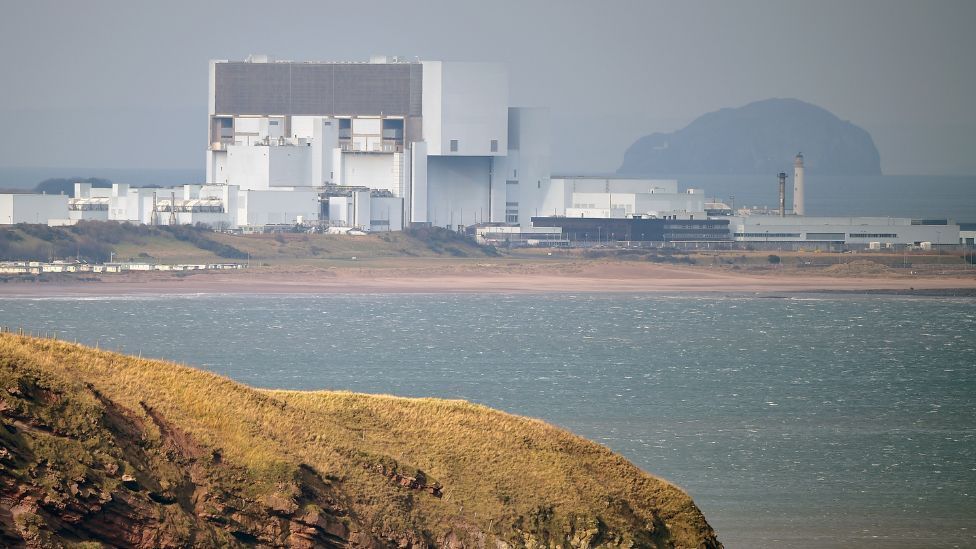UK government planning nuclear site in Scotland - Jack
The UK government is planning to build a new nuclear reactor in Scotland despite opposition from Holyrood, according to Scottish Secretary Alister Jack.
He told a House of Lords committee he had asked the UK energy minister to plan for such a site as part of a UK-wide strategy.
The Conservative minister also called for the Lords to be allowed to scrutinise Scottish laws.
First Minister John Swinney accused Mr Jack of being a "menacing behaviour" and said his government would have “nothing to do with nuclear power”.
-
Does nuclear have a role in Scotland's energy mix?
- Published6 December 2023
-
How 'green' and safe is nuclear power?
- Published17 March 2023
-
UK plans eight new nuclear reactors to boost energy
- Published7 April 2022
The UK government has committed to developing larger-scale nuclear plants south of the border, as well as developing a new generation of smaller modular reactors. It has said up to eight more nuclear reactors could be approved on existing sites.
Its ambitions for up to a quarter of all electricity to come from nuclear power by 2050 are being led by government-backed body Great British Nuclear body.
The Scottish government, however, has rejected calls to end an effective ban on new nuclear power stations.
Mr Jack told the Lords committee: "On the small nuclear reactors, I have asked the energy minister to plan for one in Scotland.
"I believe that in 2026 we'll see a unionist regime again in Holyrood and they will move forward with that."
The Scottish secretary added that he did not "see any point in having a great fight over it" given the "timescales in front of us" - a likely reference to the upcoming general election.
 IMAGE SOURCE,GETTY
IMAGE SOURCE,GETTYTorness Nuclear Power Station is due to be closed by 2028
Mr Swinney said the Scottish Secretary had not mentioned the proposals to the Scottish government.
“This is utterly and completely incompatible with good inter-governmental working and is illustrative of the damaging behaviour, the menacing behaviour, of the secretary of state for Scotland,” he said at First Minister’s Questions.
The SNP leader said the Scottish government would not support new nuclear power stations in the country, and was investing in renewable energy projects.
Scotland's last nuclear power plant - at Torness in East Lothian - is scheduled to be shut down by 2028.
Although energy policy is largely set at Westminster, the Scottish government is able to block projects it opposes as planning powers are devolved.
'Patronising'
The Scottish Secretary went on to suggest a "grand committee" of the House of Lords should be allowed to scrutinise Holyrood legislation.
“Devolution is not a bad thing," he told the committee. "Where it has failed is bad governance."
Mr Jack said the Scottish Parliament's committee structure was "not right" and that the "knowledge and wisdom" of the House of Lords could be used to help review Scottish laws.
SNP MP Tommy Sheppard said the Tory minister was "undermining and patronising our democratically-elected government".
The Scottish government said it remained opposed to the building of new nuclear plants in Scotland "under current technologies".
A spokesperson said: "Small modular reactors, while innovative in construction and size, still generate electricity using nuclear fission and therefore the process presents the same environmental concerns as traditional nuclear power plants.
“We believe that significant growth in renewables, storage, hydrogen and carbon capture provides the best pathway to net zero by 2045 and will deliver secure, affordable and clean energy supplies for Scotland."
Andrew Bowie, a minister in the Department for Energy Security and Net Zero, said the UK government would support any applicants who wanted to develop nuclear projects in Scotland.
He added: “We can’t go beyond preliminary discussions because of the current Scottish government hampering us but if the planning block was lifted then we could make a site north of the border one of the eight across the UK.”
Related Topics
News by Category
- BECBC
- Cumbria
- Nuclear
- Social Value
- Professional Services
- Clean Energy
- Business
- People
- Government
- BECBC Member News
